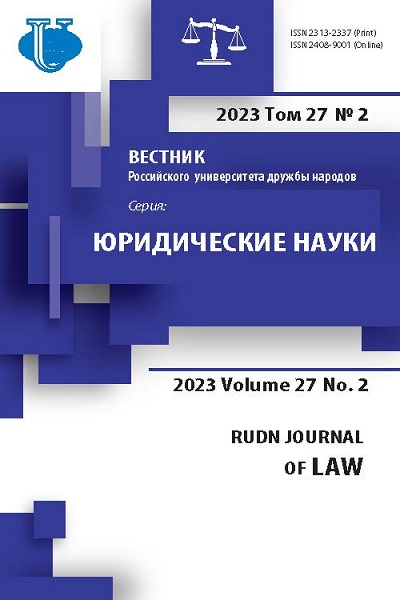United States of America and the pandemic: issues of legal regulation in combating COVID-19
- Authors: Latypova N.S.1
-
Affiliations:
- Bashkir State University
- Issue: Vol 27, No 2 (2023)
- Pages: 354-367
- Section: CONSTITUTIONAL AND MUNICIPAL LAW
- URL: https://journals.rudn.ru/law/article/view/35029
- DOI: https://doi.org/10.22363/2313-2337-2023-27-2-354-367
- EDN: https://elibrary.ru/FGGKAO
- ID: 35029
Cite item
Full Text
Abstract
The pandemic period in the United States has become a test of the strength of many state mechanisms, raised the question of the limits of the extraordinary powers of the President and governors and effectiveness of the public health system. The reasons why one of the most prosperous countries in the world has become the most affected state by the pandemic largely lie in the sphere of public administration system and historically established precedents for expanding the powers of the executive branch in times of emergency. The aim of the study is to identify the foundations of constitutional and legal regulation in combating the consequences of the pandemic in the United States and to trace correlations between peculiarities of distribution of powers in the field of public security and effectiveness of measures to counter the COVID-19 spread. One of the tasks is to identify both advantages and disadvantages of the US political structure in the context of countering the nationwide threat. The historical method of research allowed to determine the specifics of the extraordinary powers of the US President, while the specific legal method was used as the basis for analyzing the structure and powers of legislative and executive authorities along with comparative legal, system-structural and functional approaches. In the fight against the pandemic, the mechanism of public administration in the United States has shown its inability to counter threats of a nationwide nature. In many ways, this situation is explained by peculiarities of the legislative regulation of the healthcare sector, transferred to the autonomous regulation of state authorities, a disparate system of legal regulation of emergency response, as well as the very modest capabilities of the head of state in responding to epidemiological threats. The study allows to conclude that there is a correlation between the features of the public administration system in the United States, its legislative regulation and the negative consequences of the COVID-19 pandemic caused by uncoordinated actions of federal and regional government authorities.
Keywords
About the authors
Natalia S. Latypova
Bashkir State University
Author for correspondence.
Email: marchrose@yandex.ru
ORCID iD: 0000-0002-4583-3765
Candidate of Legal Sciences, Associate Professor, Law Institute
131 Dostoevsky str., Ufa, 450005, Russian FederationReferences
- Alferov, O.L. & Alferova, E.V. (2022) “Taming” the pandemic: legal approaches to the fight against coronavirus in Italy, the USA and China. Social sciences and humanities. Domestic and foreign literature. Series 4: State and law. (1), 153-165. https://doi.org/10.31249/rgpravo/2022.01.12 (in Russian).
- Burris, S., de Guia, S., Gable, L., Levin, D., Parmet, W.E. & Terry, N.P. (2021) The Legal Response to COVID-19: Legal Pathways to a More Effective and Equitable Response. Journal of Public Health Management and Practice. (27), 72-79.
- Cherkasov, A.I. (2022) Modern federalism in the context of the COVID-19 pandemic. Comparative Constitutional Review. 4(149), 110-128. (in Russian).
- Christopher, A., Amano, K., Bang-Jensen, B., Fullman, N. & Wilkerson, J. (2021) Pandemic Politics: Timing State-Level Social Distancing Responses to COVID-19. Health Polit Policy Law. 46(2), 211-233.
- Chubarova, T.V. & Sharova, M.A. (2020) Public Policy as a factor influencing spread of COVID-19 pandemic: lessons for Russia. Public administration. Electronic bulletin. 2020. (83), 84-107. https://doi.org/10.24411/2070-1381-2020-10110 (in Russian).
- Cormacain, R. & Bar-Siman-Tov, I. (2020) Legislatures in the Time of Covid-19. The Theory and Practice of Legislation. (8), 3-9.
- Corradetti, C. & Pollicino, O. (2021) The «war» against COVID-19: State of exception, state of siege, or (constitutional) emergency powers?: The Italian case in comparative perspective. German Law Journal. 22(6), 1060-1071. https://doi.org/10.1017/glj.2021.48
- Farber, D. (2004) Lincoln’s Constitution. Chicago, University of Chicago Press.
- Koenig, L. (1975) The Chief Executive. 3rd ed. New York, Harcourt Brace Jovanovich.
- Kostyaev, S.S. (2021) The US healthcare system in a pandemic and socio-demographic consequences of COVID-19. Economic and social problems of Russia. (2), 33-49. (in Russian).
- Latypova, N.S. (2021) History of emergency powers of the US Presidents: from Abraham Lincoln to Donald Trump. Bulletin of Volgograd State University. Series 4: History. Regional studies. International relations. 26(4), 193-211. https://doi.org/10.15688/jvolsu4.2021.4.17
- Latypova, N.S. (2022) Discussion on the causes of the Civil War in the USA (1861-1865): periodization of historiography. Bulletin of Volgograd State University. Series 4: History. Regional studies. International relations. 27(2), 8-20. https://doi.org/10.15688/jvolsu4.2022.2.1
- Латыпова, Н.С. Дискуссия о причинах гражданской войны в США (1861-1865): периодизация историографии // Вестник Волгоградского государственного университета. Серия 4: История. Регионоведение. Международные отношения. 2022. Т. 27. № 2. С. 8-20. doi: 10.15688/jvolsu4.2022.2.1.
- Lungu, E.V. (2020) COVID-19 pandemic. New challenge for constitutional relations. Law Enforcement Review. 4(3), 69-75. https://doi.org/10.24147/2542-1514.2020.4(3).69-75 (in Russian).
- Scott, M. Jr. (2009) Presidential Constitutionalism in Perilous Times. Cambridge, Harvard University Press.
- Tessuto, G. (2005) Ambiguity and vagueness in human rights discourse. In: Bhatia, V.K., Engberg, J. Gotti, M. & Heller, D. (eds.). Vagueness in normative texts. Bern, Peter Lang. pp. 287-312.
- Tichenor, D.J. (2013) Historical set points and the development of U.S. Presidential emergency power. Perspectives on Politics. 11(3), 769-788. https://doi.org/10.1017/ S1537592713002132
- Timonin, M.A. (2022) From the history of the constitutional opposition of the American states to privileges. The rule of law: theory and practice. 2(68), 169-179. https://doi.org/10.33184/pravgos-2022.2.18 (in Russian).
- Weiss, A. (2021) Binding the bound: state executive emergency powers and democratic legitimacy in the pandemic. Columbia law review. 121 (6), 1853-1894.
- Wiley, L.F., Yearby, R. & Hammond, A. (2021) United States: legal response to COVID-19. In: King, J. & Ferraz, O. L.M. et al. (eds.). The Oxford Compendium of National Legal Responses to Covid-19. Oxford University Press.
Supplementary files















